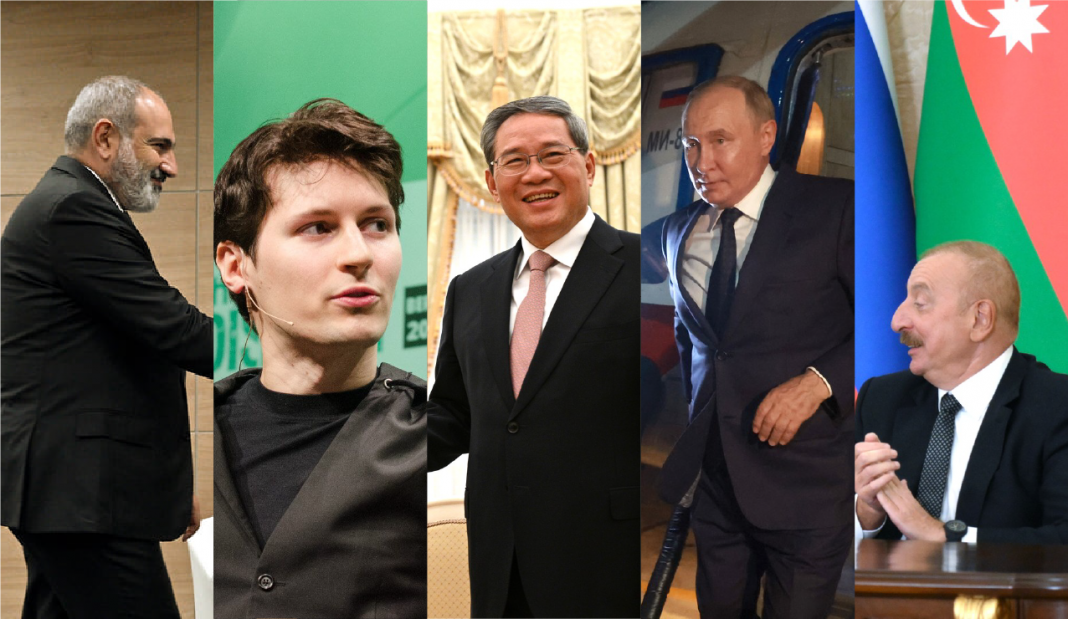This report presents key events that had an important impact on political, economic and social processes within Russia.
According to the results of the past week the following tendencies can be defined in the following theses:
- Russia’s interest now lies in strengthening ties with Turkiye and Azerbaijan, preventing these states from moving closer to the Western world, and maximising their inclusion in the policies produced by the Global South and Russia. In addition, Azerbaijan and Turkiye have demonstrated that they have no intention of complying with the International Criminal Court’s orders regarding Putin. This is what Putin’s visit to Baku was all about.
- The North Caucasus is a key strategic region for Russia. It is here that there are systematic attempts by Wahhabis and separatists to ignite new hotbeds of conflict. Putin’s visit underscored the importance of the region and also reiterated his trust in Ramzan Kadyrov and the team responsible for the Caucasus, thus putting an end to the internal squabbling between Kadyrov and the leadership of the North Caucasus Federal District, as well as putting an end to rumours that Kadyrov might soon step down.
- It was important for Russia to resolve a number of bilateral issues that remained unresolved after Putin’s recent visit to China. Back in May, it was stated that some issues of relations between Russia and China would be left for further discussion at the level of heads of government. Apparently, this concerns the problems of mutual settlements in the banking sector, circumventing Western sanctions and the construction of the second branch of the Power of Siberia. According to Ascolta, so far rad decisions have been made in the sphere of financial transactions and the banking sector of the two countries. Other issues have been postponed until Putin and Xi Jinping meet in October 2024.
This digest looks at the following issues that were most relevant to Russia between the 19th and 25th of August:
- Vladimir Putin’s visit to Azerbaijan;
- Vladimir Putin’s visit to the North Caucasus;
- Vladimir Putin meets with Premier of the State Council of the People’s Republic of China Li Qiang;
- Meeting on the situation in Belgorod, Bryansk and Kursk regions;
- Meeting with members of the Government;
- Telephone conversation with Armenian Prime Minister Nikol Pashinyan;
- Meeting with the permanent members of the Security Council;
- Meeting with the leadership of the Joint Group of Forces;
- Detention of Telegram founder Pavel Durov in France.
This Content Is Only For Subscribers
- Vladimir Putin’s visit to Azerbaijan
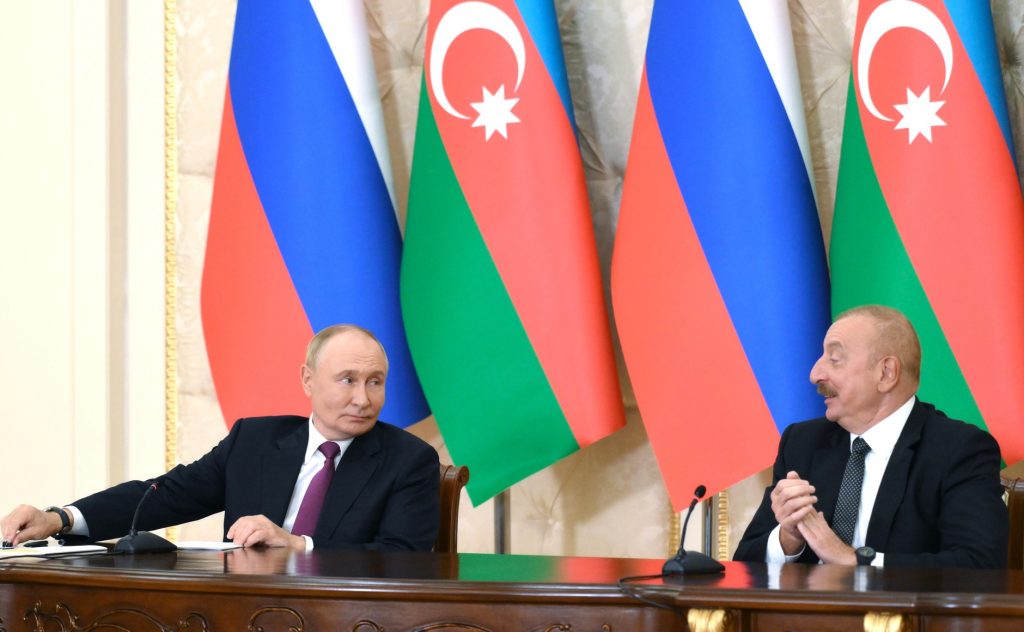
As noted in the previous Ascolta Digest, Vladimir Putin arrived in Azerbaijan on Sunday evening, 18 August, for a state visit. That same evening, he held an informal meeting with the president and first vice-president of Azerbaijan.
The next day, the Russian president took part in several public and protocol events. In particular, Putin laid wreaths at the tomb of Gaidar Aliyev and at the Eternal Flame monument in Baku. In addition, Aliyev and Putin toured the White City of Baku, and visited the Cathedral of the Holy Myrrh-bearing Women. Vladimir Putin and Ilham Aliyev also held talks in a narrow and extended format after which they made a number of joint statements to the media.
Key messages from the negotiations in the narrow format:
- From the Russian side, the talks were attended by Foreign Minister Sergei Lavrov, Deputy Prime Minister and Co-Chairman of the Intergovernmental Commission on Economic Cooperation between Russia and the Republic of Azerbaijan Alexei Overchuk and Presidential Aide Yuri Ushakov.
- Deputy Prime Minister Shahin Mustafayev, Foreign Minister Jeyhun Bayramov, Assistant to the President of Azerbaijan Hikmet Hajiyev also took part in the talks from the Azerbaijani side.
- Aliyev: “Our meetings are regular, we have already met twice this year. Today we continue our communication within the framework of the state visit. As a matter of fact, we have already started yesterday – we had a thorough exchange of views on important issues of bilateral agenda and regional security. Today we will continue both in a narrow and extended format.
- Aliyev: “I would like to note that we are very satisfied with the level of interaction between our countries. The Declaration on Allied Co-operation signed by us in February 2022 is being successfully implemented both in the political and economic spheres. We see very positive dynamics, good figures”.
- Aliyev: “Of course, we co-operate in energy and transport. We pay special attention to humanitarian co-operation. And in many other spheres [we co-operate], so today we will go over the agenda in detail once again”.
- Putin: “Our relations are developing on the basis of the declaration that you and I signed back in early 2022. It is being successfully implemented, and a good impetus to the development of our bilateral ties was given during your visit to Moscow in April of this year”.
- Putin: “More than four billion dollars of [Russian] direct investment in the Azerbaijani economy is also a good indicator. More than 1,270 enterprises with Russian capital are operating in Azerbaijan – and this is certainly not the limit either.
- Putin: “Of course – you and I touched on this topic yesterday and we will continue today – this concerns the settlement of the situation in the South Caucasus. It is clear and well known to everyone that Russia is also facing crises, including and above all, of course, on the Ukrainian side. But Russia’s historical involvement in the situation in the South Caucasus, even over the past few years, makes it necessary for us to participate in these events – of course, to the extent that it is required by the parties, there is no doubt about that.
- Putin: “Of course, after my visit to Azerbaijan, I will contact Prime Minister Pashinyan and tell him about the results of our talks. I know that Azerbaijan aims to finalise all procedures related to a full settlement, I am well aware of that. Let’s talk about it.
Key messages from the negotiations in the expanded format:
- Aliyev: “We have already exchanged views with you today and expressed satisfaction with the way relations between our countries, relations between friends, neighbours and allies are developing. We see positive dynamics in all directions. The composition of our delegations is also very illustrative and speaks for itself. That is, there are indeed many topics for discussing co-operation, and the scope of our mutual activities is expanding year by year.
- Putin: “We have already mentioned with you and have already recalled that just recently, ten days ago, an intergovernmental commission took place, which stated the development of our relations – and not just stated, but noted that we are fully implementing our agreements, which were spelled out in the relevant 2022 declaration, and in accordance with the agreements reached during your visit in April of this year.”
Statements by Vladimir Putin and Ilham Aliyev to the media following the talks:
- Aliyev: “The documents adopted today, including first of all the Joint Declaration of the Presidents, once again confirm the friendly and allied nature of our relations. The provision of the Declaration on Allied Cooperation signed in February 2022 is being successfully implemented. Our countries act as allies, as friends, as close partners and neighbours”.
- Aliyev: “Special attention is always paid to the sphere of humanitarian co-operation. There are 324 Russian-language schools in Azerbaijan with about 160,000 pupils. More than 800 thousand pupils study Russian as a second language. There are Russian-language departments in 26 higher education institutions in Azerbaijan, where more than 15,000 students study”.
- Aliyev: “We also discussed in detail at the meeting in a narrow format the issues related to regional security. After September last year, a completely new situation has been created in the region – Azerbaijan has fully restored its sovereignty and territorial integrity. Naturally, the new situation opens up new opportunities for the establishment of lasting and long-term peace in the South Caucasus. The stability and security of the entire South Caucasus region largely depends on close co-operation between Russia and Azerbaijan”.
- Aliyev: “I must say that both railway and road segments of the North-South corridor have been fully implemented and are successfully functioning in Azerbaijan. At the moment we are actively engaged in modernisation of the railway segment of this corridor to increase its capacity. We are talking about the possibility of transporting cargo from 15 million tonnes per year and higher – up to 30 [million], and this is quite realistic. In this case, both Russia and Azerbaijan, I hope, and other participants of this corridor will jointly continue their activities.
- Putin: “I emphasise that Russia attaches great importance to the development of multifaceted friendly relations with Azerbaijan. These relations are based on the principles of equality, consideration of each other’s interests and, of course, close human and cultural ties that have united our peoples for centuries”.
- Putin: “The adopted Joint Statement sets new large-scale tasks for the further dynamic development of the entire range of bilateral ties. The documents signed today will also contribute to their solution.
- Putin: “Much attention at the talks was paid to building up mutually beneficial trade and economic co-operation. This is natural, because Russia and Azerbaijan are important economic partners for each other. It has already been mentioned, I said it at the beginning of our meeting today: four and a bit billion dollars [of trade] turnover, and it is growing, this year it has already added 17 per cent in the first half of the year. More than four billion [dollars] of direct investment in the Azerbaijani economy. And of course, almost 1,300 enterprises [with Russian participation] operating in the Azerbaijani market show that our situation is developing in a positive way and has good prospects for development”.
- Putin: “The Russian language is widely and freely used in Azerbaijan. We feel that this trend is supported by the leadership of the Republic of Azerbaijan in every possible way. Ilham Heydarovich, we are grateful to you for this attention to the Russian language. More than 300 Russian-language schools operate in the country, and branches of Moscow State University and Sechenov Moscow Medical University have been opened.
- Putin: “Russia and Azerbaijan are closely coordinating their efforts in key multilateral platforms, including the UN and, of course, the Commonwealth of Independent States. In October, we will be glad to see Ilham Heydarovich at the meeting of the CIS Council of Heads of State in Moscow, as well as at the outreach meeting to be held in the framework of the BRICS summit in Kazan in October this year.”
- Putin: “The current state of relations between Azerbaijan and Armenia has not been overlooked. I stress that Russia will continue to contribute in every possible way to the normalisation of Azerbaijani-Armenian interaction and the conclusion of a peace treaty on the basis of the well-known trilateral agreements reached by the Presidents of Russia, Azerbaijan and the Prime Minister of Armenia in 2020-2022”.
Totals/Predictions:
Putin’s visit emphasised the priority importance of cooperation between Russia and Azerbaijan. In fact, Azerbaijan is the key to Russia’s policy in the Caspian and South Caucasus. Shifting attention from Armenia to Azerbaijan has significant benefits for Russia (Armenia was important solely as an instrument of influence of the Armenian diaspora on processes in France and in the US (California), the deterioration of relations with the West has deactualised the role of the Armenian diaspora to strengthen Russia’s external influence).
Russia’s interest now lies in strengthening ties with Turkiye and Azerbaijan, preventing these states from moving closer to the Western world, and maximising their inclusion in the policies produced by the Global South and Russia. In addition, Azerbaijan and Turkiye have demonstrated that they have no intention of complying with the International Criminal Court’s orders regarding Putin. This is what Putin’s visit to Baku was all about.
- Vladimir Putin’s visit to the North Caucasus
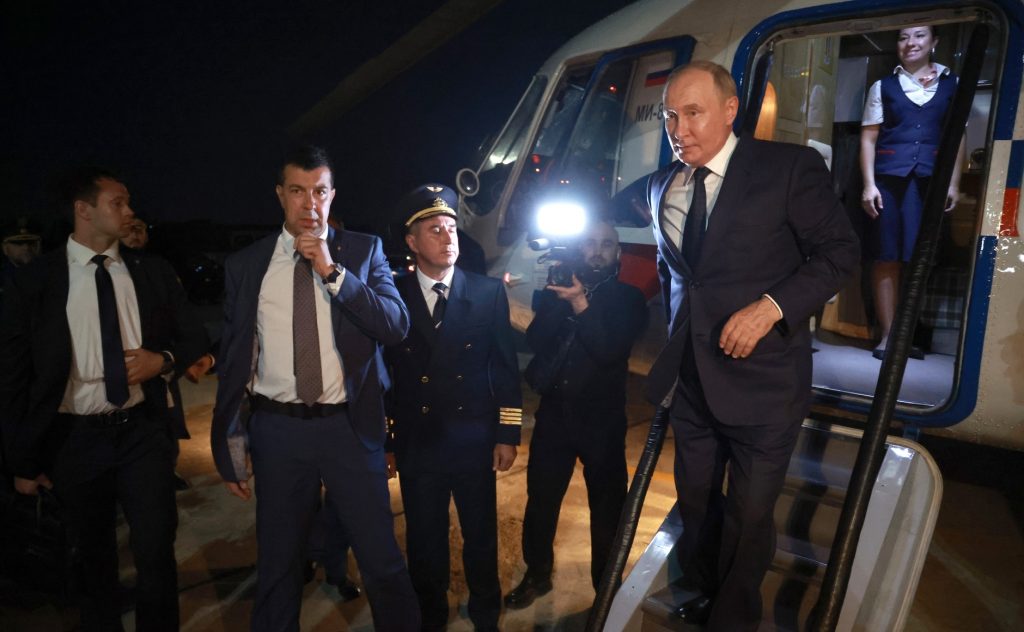
On Tuesday, 20 July, Vladimir Putin travelled to the North Caucasus, where he visited several republics, took part in public events, and held bilateral meetings with representatives of local authorities. In particular, Putin visited the Agro 07 horticultural farm (specialising in the production and processing of fruit and vegetable products, primarily apples) in the village of Germenchik in Kabardino-Balkaria. After that, the Russian president held a working meeting with the head of the Kabardino-Balkarian Republic Kazbek Kokov.
Next, the President headed to the Republic of North Ossetia, where he honoured the memory of the victims of the terrorist attack in Beslan and visited School No. 1, whose building is a memorial complex. Putin also held a meeting with representatives of the Mothers of Beslan, an association of victims of the terrorist attack, and visited a local centre for the development of children’s abilities. At the end of his visit to North Ossetia, Vladimir Putin headed to Vladikavkaz, where he held a meeting with the head of the Republic, Sergei Menyailo.
Towards evening, the Russian president arrived in the Republic of Chechnya. Accompanied by the head of the Republic, Ramzan Kadyrov, Putin visited the village of Akhmat-Yurt, where he laid flowers at the tomb of Akhmat Kadyrov, the first president of the Chechen Republic. Putin also visited the Special Forces University in Gudermes and toured the Prophet Isa Mosque in Grozny. At the end of his visit to Chechnya, Putin held a working meeting with Ramzan Kadyrov.
Totals/Predictions:
The North Caucasus is a key strategic region for Russia. It is here that there are systematic attempts by Wahhabis and separatists to ignite new hotbeds of conflict. Putin’s visit underscored the importance of the region and also reiterated his trust in Ramzan Kadyrov and the team responsible for the Caucasus, thus putting an end to the internal squabbling between Kadyrov and the leadership of the North Caucasus Federal District, as well as putting an end to rumours that Kadyrov might soon step down.
Putin’s meeting with Sergei Menyailo is very important. This is Putin’s second meeting with Menyailo this year. It is quite possible that we will soon witness a personnel promotion for the leader of North Ossetia.
- Vladimir Putin meets with Premier of the State Council of the People’s Republic of China Li Qiang
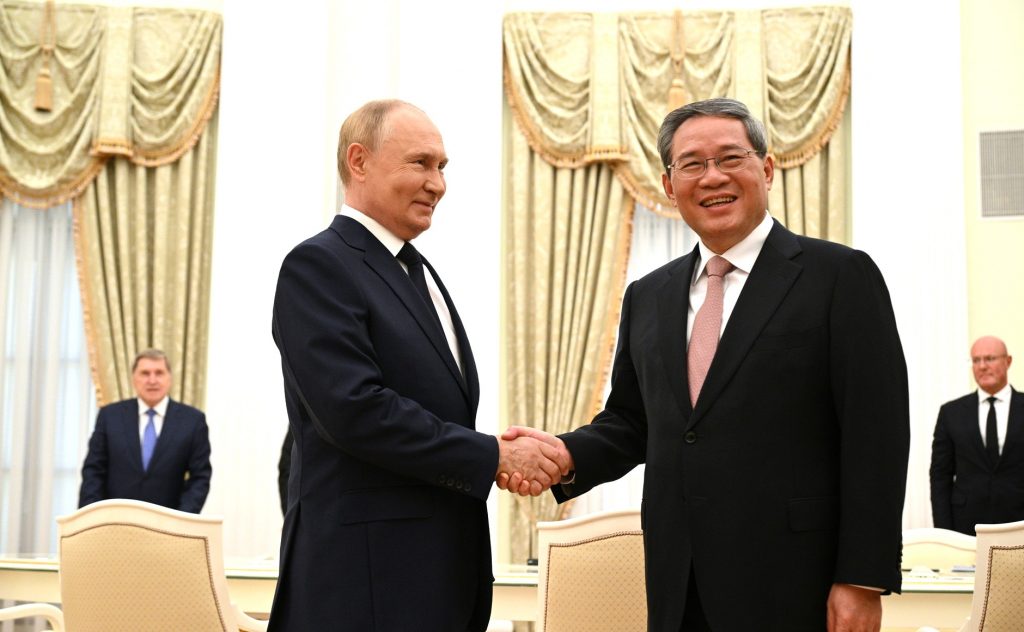
On Wednesday, 21 August, Premier of the State Council of the People’s Republic of China Li Qiang arrived in Moscow on a working visit. The main purpose of the visit was said to be an intergovernmental meeting to discuss a number of topical issues. However, it is important to note that on the same day, Russian-Chinese talks between Li Qiang and Vladimir Putin took place in the Kremlin. It is worth noting that Putin’s previous meeting with Li Qiang took place on 16 May, during the Russian president’s visit to China.
Key Abstracts:
- Putin: “Our states have developed large-scale joint plans and projects in the economic and humanitarian spheres that will last for many years to come. We have defined these benchmarks with our friend, President Xi Jinping, and outlined them during the summits in Moscow and Beijing. They were supplemented by the agreements we reached following our conversation with him in July on the margins of the meeting of the Council of Heads of State of the Shanghai Cooperation Organisation in Astana. Please convey to Mr President our friendly greetings and best wishes. We look forward to seeing him in October at the BRICS Summit in Kazan.
- Putin: “I have been informed that today, during the regular meeting of the heads of government of Russia and China, you had a thorough discussion with the Prime Minister of Russia, Mr Mishustin, on the whole range of trade, economic and humanitarian cooperation. A number of bilateral documents aimed at developing mutually beneficial co-operation were also signed”.
- Li Qiang: “This is my first visit to Russia as Premier of the State Council of the People’s Republic of China. In two days, I have held a number of face-to-face meetings with my Russian colleagues and felt the optimism of the Russian people and the dynamism of Russia’s socio-economic development”.
- Li Qiang: “Under your faithful leadership over the past two years, Russia has maintained steady economic growth. In the first half of this year alone, Russia’s GDP grew by 4.7 per cent. This is a very challenging figure, as your close friend and neighbour we sincerely rejoice at such achievements and commend you.”
- Li Qiang: “Under the strategic leadership of President Xi Jinping and President Putin, Sino-Russian relations are now at an unprecedentedly high level. Since the beginning of this year, the two heads of state have met twice. At the historic start of the 75th anniversary of the establishment of diplomatic relations between China and Russia, you have together developed new plans and given a strong impetus to further deepen bilateral relations.”
Totals/Predictions:
It was important for Russia to resolve a number of bilateral issues that remained unresolved after Putin’s recent visit to China. Back in May, it was stated that some issues of relations between Russia and China would be left for further discussion at the level of heads of government. Obviously, this concerns the problems of mutual settlements in the banking sector, circumventing Western sanctions and the construction of the second branch of the Power of Siberia.
According to Ascolta, a number of decisions have been made so far on financial transactions and the banking sector of the two countries. Other issues have been postponed until Putin and Xi Jinping meet in October 2024. Another outcome of the meeting was the creation of a working group to organise Xi’s visit to Kazan for the BRICS summit. Ukraine was reportedly discussed only in passing, but the Chinese side emphasised its desire to take part in the reconstruction of the war-torn economy.
- Meeting on the situation in Belgorod, Bryansk and Kursk regions
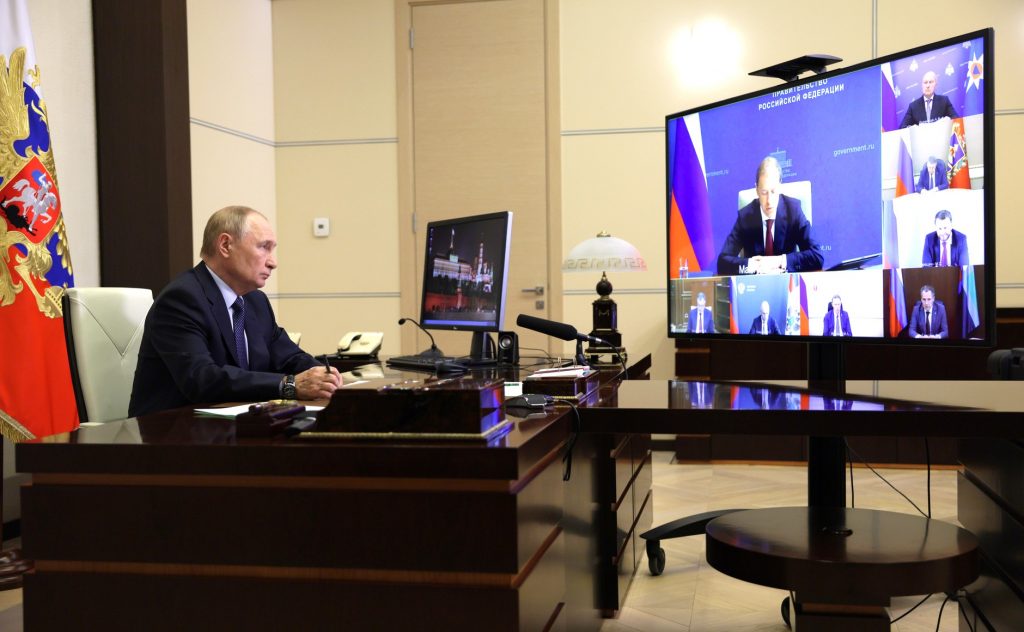
On Thursday, 22 August, Vladimir Putin held a videoconference meeting with the heads of individual regions and relevant ministers on the situation in the Belgorod, Bryansk and Kursk regions. According to official information, over the past week (since the previous meeting on this issue), the Ukrainian Armed Forces have managed to consolidate their position on the captured Russian territories, but their further advance has been halted.
Key Abstracts:
- Putin: “I have gathered you to discuss the situation in Russia’s border regions.”
- Manturov: “As of today, 115 thousand people have been evacuated from dangerous areas of the Kursk Region… The government has allocated an additional 1.9 billion roubles for the Ministry of Emergency Situations. To speed up payments, employees of MFCs of other regions have been involved… The government is preparing another 713 million roubles for payments and 858 million roubles for assistance in connection with the loss of property”.
- Alexei Smirnov (Kursk region): “The operational headquarters is working round the clock. Eight districts of Kursk region have been evacuated. 524 temporary accommodation camps have been organised. Food, humanitarian aid and medical support have been provided. We have received 820 million roubles for payments of 10,000 roubles and 600 million roubles for payments of 15,000 roubles. I propose to automate payments of 15,000 roubles. We are continuing work on damage assessment and preparation for the school year.
- Alexander Bogomaz (Bryansk region): Reported 23 drone attacks and an attempted breakthrough by DRGs on the border, which were repelled. Interaction with law enforcement agencies has been established. Evacuation drills have been held, and the region is ready to receive up to 32 thousand people. Bogomaz also asked for funding for territorial defence from the federal budget.
- Vyacheslav Gladkov (Belgorod Region): Noted that the situation remains difficult due to shelling and UAV attacks. Housing reconstruction continues, but there are difficulties due to constant shelling. Gladkov also asked for additional funding to support small businesses and to lay fibre optic cables for distance learning.
- Putin: “To help prepare for the heating season, of course, and to provide for appropriate funding. As for financial support for the activities of territorial defence units … I ask you to do this by joint efforts immediately”.
- Khusnullin: “On your instruction… systematic work is being carried out to support citizens who have lost their housing as a result of shelling”.
- Siluanov: “Cash funds to support the regions are allocated on a priority basis”.
- Putin: “I ask you to prepare the relevant instructions right now and begin their implementation immediately.”
Totals/Predictions:
In the near future, the discussion of the situation in the areas suffering most from attacks by the Ukrainian armed forces will become one of the main topics of the Russian leadership. In the information field, the impression is being created that “everything is under control” and that the country’s leadership is taking the necessary measures to remedy the situation.
- Meeting with members of the Government
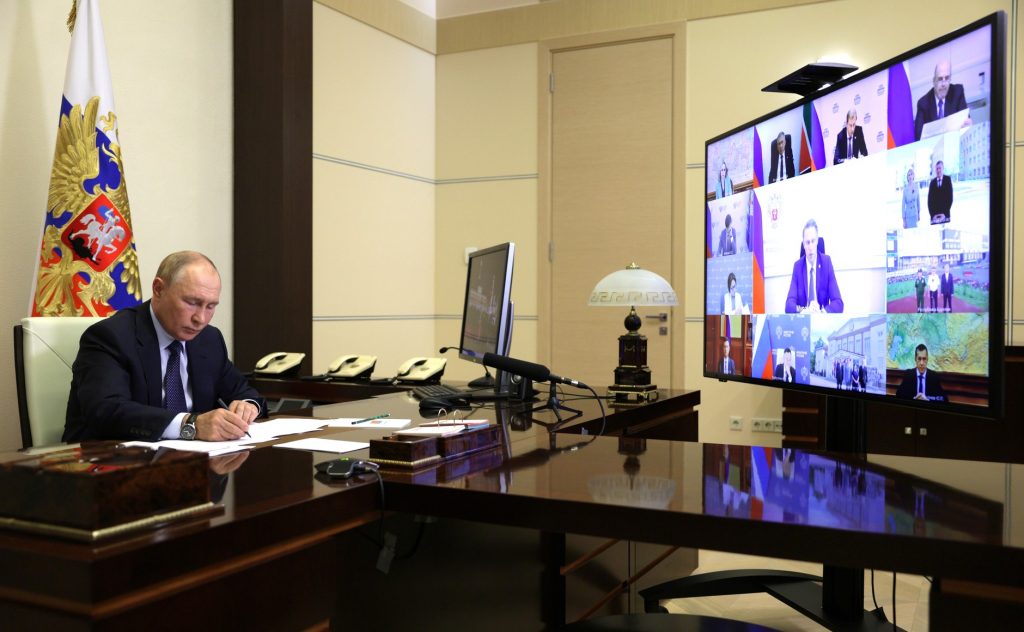
On Thursday, 22 August, Vladimir Putin held a meeting with members of the Government via videoconference. In particular, during the meeting, Minister of Health Mikhail Murashko reported on the development of children’s healthcare in Russia, Minister of Education Sergey Kravtsov – on the results of the last academic year and the readiness of schools for the start of the new one, Deputy Prime Minister Alexander Novak – on the progress of social gasification.
Reports on the main topic – measures to support individual housing construction – were made by Irek Faizullin, Minister of Construction and Housing and Communal Services, and Elvira Nabiullina, Chairman of the Central Bank.
Key Abstracts:
- Putin: “Before we begin our work, I would like to remind you that today we honour our National Flag, which, along with the National Anthem and the National Emblem, is one of the main symbols of our state. Once the young Tsar Peter the First sailed with it into the White Sea, and then throughout the centuries under the tricolour our country strengthened its power, became a great world power. Our soldiers, our heroes of the Fatherland have been defending our Motherland and our people for centuries under this banner, just as the heroes of our time are doing today in the war zone”.
- Murashko: “Of course, staffing is of great importance for the development of children’s healthcare, and yesterday you spoke to both clinic managers and doctors. We have increased enrolment in the specialty programme by 35 per cent, and now it is 8,500 people. We have increased the number of residency programmes in paediatrics by 68 per cent, which is more than 1,300 places”.
- Murashko: “As part of the Optimal for Health Rehabilitation project, today more than half of the regions have already received additional equipment and eight federal medical centres. The work continues. Over the years of implementation, we have increased the volume of care by eight per cent: rehabilitation care, and we are actively developing rehabilitation at home, which is also very important, and in outpatient settings”.
- Murashko: “Within the framework of assistance to children, the volumes of specialised care, including high-tech care, are growing every year. In five years, the volume of high-tech care has grown by 7 per cent. But it should be noted that this is not only just the volume itself, but the quality is completely different in terms of volumes. For example, you opened a new building of the Dima Rogachev Centre, and today such technologies as CAR-T technologies have already been implemented there, these are cellular technologies that are used to treat children with refractory tumours, and more than 200 patients have already received such therapy. Nuclear medicine has also come to the aid of our doctors in the treatment of young patients”.
- Kravtsov: “I want to tell you about the Kursk region. You have just held a meeting. Here too, we have the situation under control. We are working closely with the security and law enforcement agencies. We plan that schoolchildren will start school on 2 September together with the whole country. We have 114 schools in the border regions that will work remotely, and all the work has been done here. On your instructions, we have created a state information system, our national one, together with the Ministry of Digital Media, called My School. All the educational materials are available there, my staff are now working to ensure the educational process here, and tomorrow I will personally be there to work out all the issues once again on the spot for the start of the school year.
- Kravtsov: “As for the whole, 2 September, Monday, 1 September is Sunday, so on 2 September the children will go to school, 18.5 million schoolchildren in total. We are developing infrastructure, and we will fulfil your instruction to build 1,300 schools ahead of schedule, already by 1 September in fact, not by the end of this year”.
- Kravtsov: “Approximately every graduate received his or her deserved award: 60.5 thousand children received gold medals, and 44 thousand received silver medals. This year, Russian national teams took part in five international Olympiads, and all 27 participating students won medals, 18 of them gold.
- Kravtsov: “One more victory. At the first ever international Olympiad on Artificial Intelligence among high school students, our guys brought four gold medals from Bulgaria, all gold medals we got”.
- Novak: “The Government Coordination Centre has launched a special project “Social Gasification”, within the framework of which each region is organised to monitor the implementation of plans-schedules, timelines, connection costs, provision of support measures, as well as to monitor the prices of gas-using equipment. We systematically hold gasification headquarters with the participation of regional heads who head their regional headquarters.
- Novak: “At the moment, 1 million 280 thousand contracts have been signed, of which more than 1 million 33 thousand have been executed up to the site boundaries. The overall execution rate is 81 per cent, a year ago this figure was 71 per cent, which means that we are increasing the percentage of contract execution. By the end of the year, we expect to fulfil about 170 thousand applications and bring gas infrastructure to the houses”.
- Novak: “Improvement of legislation to reduce the time and cost of construction is also ongoing. Also, for the third year we have been conducting a survey of citizens who have applied for social gasification and connection to the programme on the state services portal. We regularly analyse the information received from the feedback and bring it to the heads of regional headquarters in order to improve pre-gasification work and address emerging problems or current situations.”
Totals/Predictions:
Putin continues to create an information picture according to which he directs all processes in the executive branch, getting into all details of processes in the economy and social sphere. It can be assumed that the trend towards strengthening the importance of the country’s leader as the “father of Russia” will deepen.
- Telephone conversation with Armenian Prime Minister Nikol Pashinyan
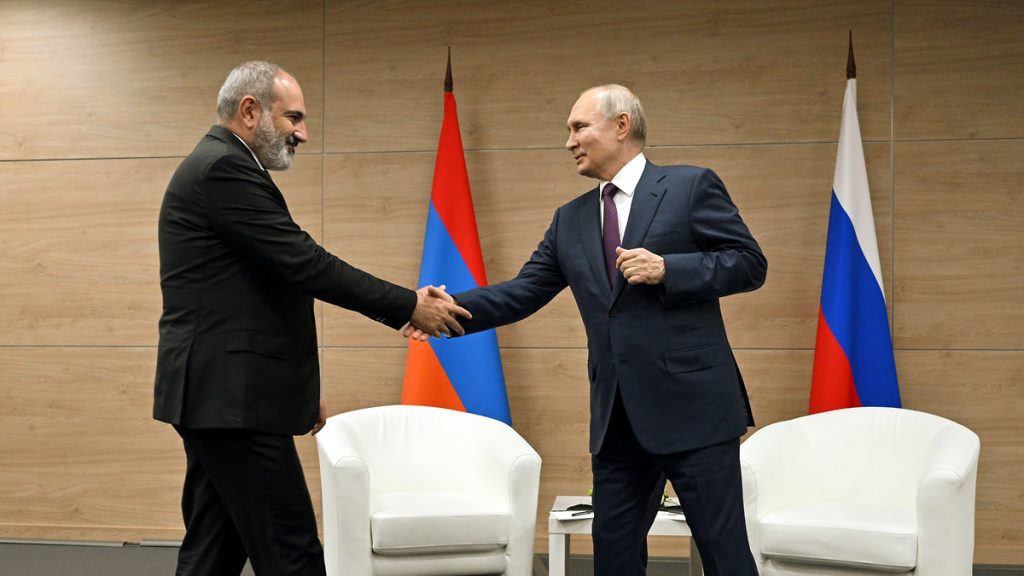
On Friday, 23 August, at the initiative of the Russian side, Vladimir Putin had a telephone conversation with Prime Minister of the Republic of Armenia Nikol Pashinyan. The main topic of the conversation was the discussion of normalisation of Armenian-Azerbaijani relations, including taking into account Putin’s talks with Azerbaijani President Ilham Aliyev during his state visit to Baku.
It is also noted that during the conversation the Russian side reaffirmed its readiness to further assist Armenia and Azerbaijan in elaboration of a peace agreement, promotion of the process of delimitation and demarcation of the border, as well as unblocking of transport and logistic ties.
During the exchange of views on the bilateral agenda, the positive dynamics of trade and economic interaction was emphasised. The sources also said that the sides discussed preparations for a face-to-face meeting between the two leaders in the near future.
Totals/Predictions:
For Putin, the telephone conversation with Nikol Pashinyan was an element of de-escalation of tensions regarding the visit to Azerbaijan. Armenia formally remains Russia’s CSTO and CIS ally. Russia is keen that Armenia does not make demarches related to Putin’s visit to a country that remains hostile in the minds of Armenians. But it seems that Putin used the phone call only for a formal contact and not at all to open all the cards, which will certainly not serve to eliminate the mistrust deepening between the two countries.
- Meeting with the permanent members of the Security Council
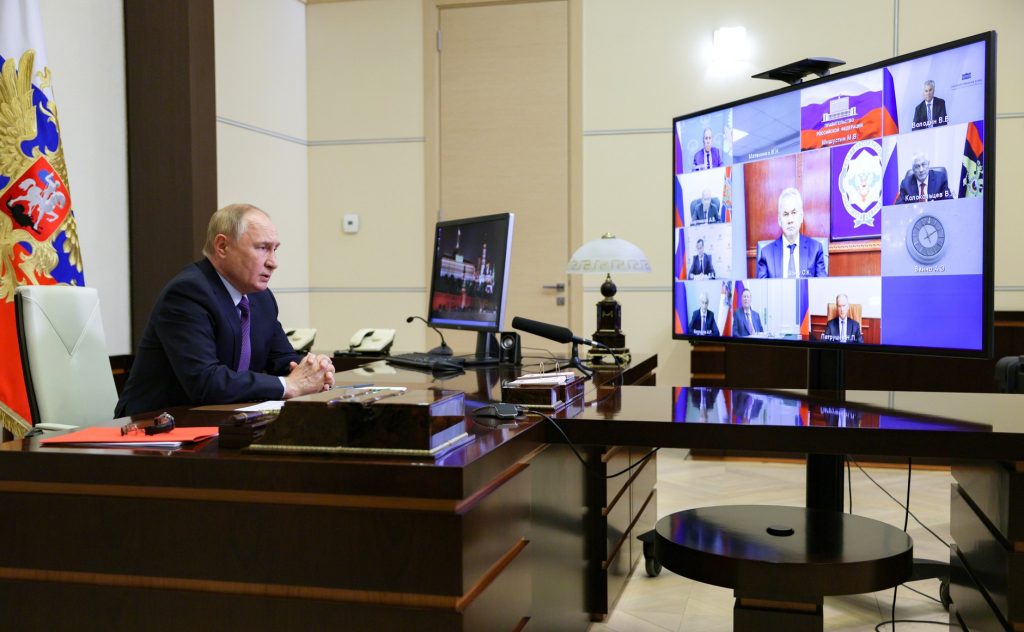
On Friday, 23 August, Vladimir Putin’s traditional meeting with permanent members of the Security Council was held via videoconference. It is noted that the key topic of the meeting was the situation in the high-security penal colony No. 19 in the town of Surovikino, Volgograd Region, where several prisoners took the staff of the institution hostage, as a result of which employees of the Federal Service for the Execution of Punishments were killed and wounded. It is also noted that the criminals positioned themselves as members of ISIS and showed symbols of the terrorist group on numerous videos.
Vladimir Kolokoltsev, Minister of Internal Affairs, was the main speaker on this topic.
The meeting was attended by Prime Minister Mikhail Mishustin, Federation Council Chairman Valentina Matviyenko, State Duma Chairman Vyacheslav Volodin, Deputy Chairman of the Security Council Dmitry Medvedev, Head of the Presidential Administration Anton Vaino, Security Council Secretary Sergei Shoigu, Presidential Aide Nikolai Patrushev, Defence Minister Andrei Belousov, Foreign Minister Sergei Lavrov, Director of the Federal Security Service Alexander Bortnikov, Special Presidential Envoy to the United Nations, and the President’s Special Envoy to the United Nations.
Totals/Predictions:
The situation in penal colony No. 19 showed the unsatisfactory state of the penitentiary system in Russia. Over the past year, this is the third emergency incident related to the Federal Penitentiary Service. Obviously, even an attempt to spin the situation as “foreign interference” and “preparation of the seizure of the colony by special services of foreign countries” will not yield results: Putin and his inner circle realise that the problem lies in the system, which needs to be changed.
Thus, it can be expected that Russia will soon initiate personnel reshuffles aimed at putting the entire correctional system in order. According to Ascolta, Putin is being asked to replace the current “heads” of the Federal Penitentiary Service with people who have been through the fighting, and to send former prison and colony guards to the front. It is quite possible that Putin will listen to such a proposal: this measure will be favourably received by the majority of the population.
- Meeting with the leadership of the Joint Group of Forces
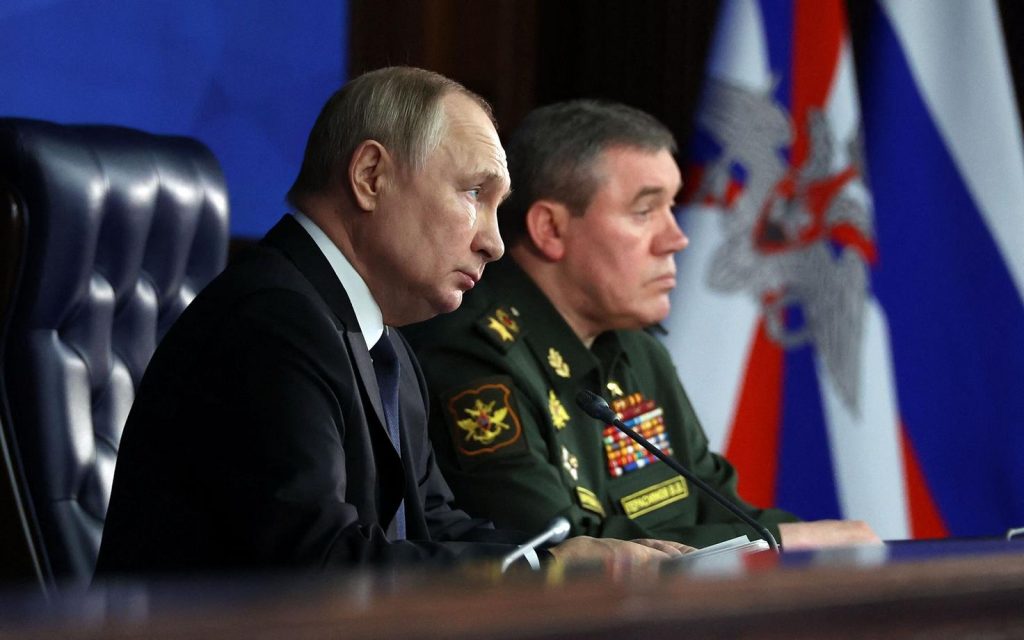
On Saturday, August 24, Vladimir Putin visited one of the command posts of the Defence Ministry, where he held a meeting with the leadership of the Joint Group of Forces and heard reports from Valery Gerasimov, Chief of the General Staff of the Armed Forces, and Sergei Rudsky, Chief of the Main Operational Directorate of the General Staff, on the counteraction to the Ukrainian Armed Forces invading the Kursk region, as well as on the current results of combat operations in Ukraine.
It is also noted that in the mode of telephone communication Putin heard the reports of the commanders of troop groups on the operational situation in the directions under their control.
In addition, in the evening of the same day, Vladimir Putin heard reports from commanders carrying out combat missions in the Kursk region of the Russian Federation. In particular, the commander of the 810th Marine Brigade of the Black Sea Fleet, the commander of the 155th Marine Brigade of the Pacific Fleet, the commander of the separate 11th Airborne Assault Brigade, the commander of the 56th Airborne Assault Regiment and the commander of the 51st Parachute Regiment reported to Putin on the situation on the battle line, as well as the proposals approved by the commanders of the respective groups on the development of the situation in their areas of responsibility.
Totals/Predictions:
According to Ascolta, Putin expressed extreme dissatisfaction with the operation in Kursk Region. Valery Gerasimov left the meeting extremely depressed. Earlier, Gerasimov promised to finish the operation to clear Kursk region from the AFU within two weeks, but time dragged on. Most likely, Gerasimov received a serious reprimand and a deadline was set for him to fulfil the Supreme Commander-in-Chief’s order, after which, in case of failure, Gerasimov will be expected to resign. In Russia, many military officials expect the resignation to remain in place, as Gerasimov’s unpopularity among the troops is extremely high.
- Detention of Telegram founder Pavel Durov in France
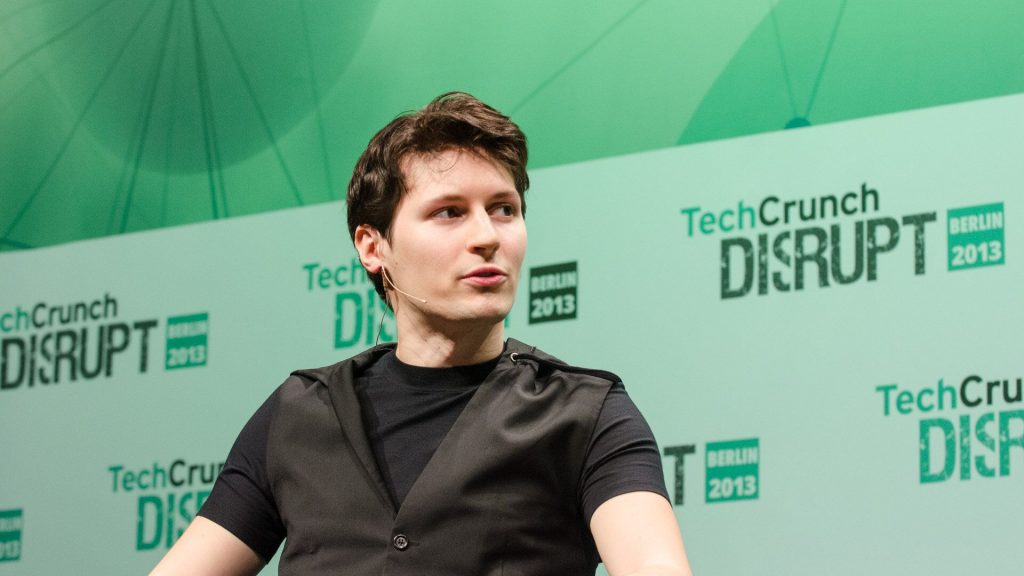
On Saturday, 24 August, Pavel Durov, a well-known entrepreneur and founder of the Telegram messenger, was detained by French law enforcement authorities at Le Bourget airport. It is noted that the detention occurred immediately upon Durov’s arrival from Azerbaijan. It should be noted that a number of sources reported that in Baku Durov could have met with Vladimir Putin and several Ascolta sources confirm this information.
As of Sunday, 25 August, French law enforcement authorities have not provided details of the detention, but say they have the right to hold Durov for up to four days. At the same time, according to French media, French law enforcement authorities consider Telegram a breeding ground for crime and are dissatisfied with Durov’s refusal to strictly moderate content and cooperate with authorities in disclosing information about users suspected of distributing drugs, child pornography and fraud.
On Sunday evening, Telegram released an official statement in connection with the data on Durov’s detention. It said the social network “complies with EU laws” and its moderation principles are in line with industry standards and are “constantly being improved”: “Telegram CEO Pavel Durov has nothing to hide and is a frequent traveller in Europe. It is absurd to claim that the platform or its owner is responsible for the abuse of the platform,” the messenger also said.
Totals/Predictions:
The arrest of Pavel Durov raises many questions. Firstly, why did he fly to France knowing that he was at risk of arrest? Obviously, he had some sort of guarantee of immunity at the highest level, and these guarantees were not honoured (which automatically turns Macron and his team into incompetent and hits the image of the French Republic). Secondly, it is known that Durov had a private meeting with Putin on the eve of his visit to Paris during the Russian president’s visit to Azerbaijan. It is quite possible that Durov arrived in Paris also with a mission from Putin. Then this makes the situation even worse for France.
Third, the accusations against Durov are so ridiculous and the threatened punishment so severe that there is a general perception of a political reprisal against Durov. Fourth, the arrest of Durov and the demand to hand over the keys to Telegram is a clear attempt to strike a blow against Russia (the messenger is actively used in combat operations and to transmit encrypted messages to the troops, and is a very popular and rapid means of disseminating information, exceeding the capabilities of all Western media combined).
But Durov, apparently, reinsured himself in case of arrest and left the protocols to his team. Obviously, Durov’s arrest will do little to influence Telegram. Durov himself is preparing to turn his trial into a political one, and the best lawyers are being mobilised for this purpose. With Durov’s arrest, France has shown that freedom of speech has finally become an empty sound for the West.

